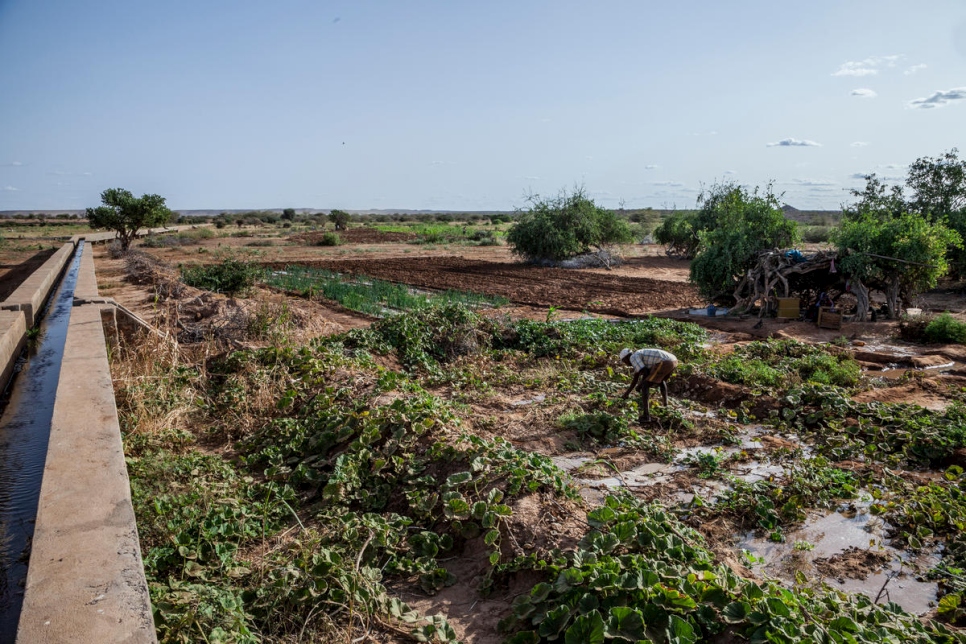Innovative investment transforms lives in Ethiopia
A pioneering partnership with IKEA Foundation turns a parched desert into valuable agricultural land for refugees and locals in Ethiopia's remote Somali region.
Refugee farmer Kaha Abdula stands beside irrigated crops in Melkadida, Ethiopia
© UNHCR/Diana Diaz
The canal system that brings precious water to farmers in this remote community in eastern Ethiopia has allowed a parched desert to bloom and a community to flourish.
“Before the canal was built, there was only bush here,” says Ibrahim Abdi Farah, Host Community Irrigation Scheme Chairman at Kobe refugee camp. “We couldn’t grow anything here. It was barely enough to eat, let alone sell.”
A new approach by UNHCR, the UN Refugee Agency, the IKEA Foundation, and Ethiopian authorities is empowering thousands of refugees and local residents like Ibrahim, devastated by successive droughts, in Ethiopia’s remote Somali region.
Together people are regaining their independence. Under the five-year partnership, some 20,000 metres of irrigation canals have been built turning a desert into valuable agricultural land.
The irrigation scheme was built two years ago. The water comes from the river through the canals and flows into the farms. Everyone has their own canal so the water gets to everyone.
“People are becoming self-reliant, they understand and support each other.”
Using the same seeds, tools and training, Somali refugees and locals are working the land together.
“We are all brothers and we do things together,” Ibrahim says. “We gave them this land because before they used to rely on assistance. Now they can be independent and help others as well.
The programme illustrates a wider response to refugee movements known as the Comprehensive Refugee Response Framework, or CRRF, which calls for a greater emphasis on refugee self-reliance and support to host communities, alongside stronger partnerships and a broader range of actors involved. The approach underpins a new global compact on refugees which is expected to be adopted by the UN General Assembly by the end of 2018.
Thanks to the project, farmers grow 13 different crops – ranging from tomatoes to onions – which are sold in markets across the country, improving the lives of refugees and local residents alike, says Host Community Chairman Mohamed Kulow Hassan.
“People are becoming self-reliant, they understand and support each other,” he says with pride. “My dream if for Melkadida to keep developing like this in the future and that it will become a great city someday.
For Somali refugee Dahaba Hassan Ibrahim and her family having a successful plot of land – and the income that it brings - has been lifesaving.
“This farm has given me freedom. Before my life depended on selling vegetables to cover the needs of my children, and on the assistance we were given. Now, because of this farm, I can buy anything I need.”
Dahaba and other parents want to be able to provide an education for their children. The project supported by UNHCR and the IKEA Foundation, is keeping many youngsters in schools and is allowing some, like 20-year-old Iqra, to continue their studies at university.
“I want to learn management, to solve the continuing problems in my country,” she says, allowing herself to dream big for the future. “If I become the president of Somalia, I will open more schools for the society, that’s my wish and my dream and I will.”

